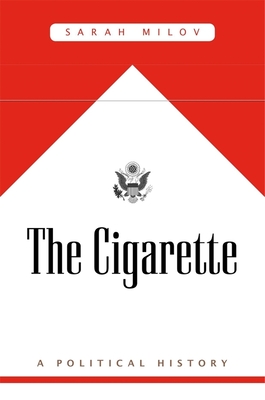

 Harvard University Press
Harvard University Press
The Cigarette: A Political History


Key Metrics
- Sarah Milov
- Harvard University Press
- Hardcover
- 9780674241213
- 9.5 X 6.3 X 1.3 inches
- 1.5 pounds
- History > United States - 20th Century
- English
 Secure Transaction
Secure TransactionBook Description
The untold political story of the most controversial consumer product in American history.
Tobacco is the quintessential American product. From Jamestown to the Marlboro Man, the plant occupied the heart of the nation's economy and expressed its enduring myths. But today smoking rates have declined and smokers are exiled from many public spaces. The story of tobacco's fortunes may seem straightforward: science triumphed over our addictive habits and the cynical machinations of tobacco executives. Yet the reality is more complicated. Both the cigarette's popularity and its eventual decline reflect a parallel course of shifting political priorities. The tobacco industry flourished with the help of the state, but it was the concerted efforts of citizen nonsmokers who organized to fight for their right to clean air that led to its undoing.
After the Great Depression, public officials and organized tobacco farmers worked together to ensure that the government's regulatory muscle was more often deployed to promote tobacco than to protect the public from its harms. Even as evidence of the cigarette's connection to cancer grew, medical experts could not convince officials to change their stance. What turned the tide, Sarah Milov argues, was a new kind of politics: a movement for nonsmokers' rights. Activists and public-interest lawyers took to the courts, the streets, city councils, and boardrooms to argue for smoke-free workplaces and allied with scientists to lobby elected officials.
The Cigarette restores politics to its rightful place in the tale of tobacco's rise and fall, illustrating America's continuing battles over corporate influence, individual responsibility, collective choice, and the scope of governmental power.
Author Bio
I am a historian of the twentieth century United States. My work focuses on how organized interest groups and everyday Americans influence government policy and the terms of political debate. Right now I'm beginning a project that examines the relationship between gender and whistleblowing in the modern United States.
I begin from the premise that there was something constitutive and not coincidental about the simultaneous rise of women in the workforce and the proliferation of whistleblower protection laws beginning in the 1970s. At the same time, strategies used by corporations and government bureaucracies to discredit whistleblowers--regardless of gender--frequently cast them in feminized, hysterical terms.
By looking at the intertwined history of whistleblowing and gender, I hope that three dynamics central to the history of knowledge, capitalism, and modern politics become more clear: new knowledge—and new risks— created by the movement of women into jobs traditionally held by men; the promise and perils of claiming authority as women or sexual minorities; and the gendered techniques of corporate crisis management.
My first book, The Cigarette: A Political History is a history of tobacco in the twentieth century that places farmers, government officials, and citizen-activists at the center of the story. Rather than focusing exclusively on "Big Tobacco," I argue that domestic and global cigarette consumption rose through the efforts of organized tobacco farmers and US government officials; and that it fell as a result of local government action spurred by the efforts of citizen-activists and activist lawyers.
The Cigarette won the PROSE Award for North American History from the Association of American Publishers. It was a finalist for the LA Times Book prize and one of Smithsonian Magazine's "Best History Titles of 2019."
Education
- Ph.D. Princeton University, 2013
- M.A. Princeton University, 2009
- B.A. Harvard , 2007
Source: University of Virginia - Department of History
Community reviews
Write a ReviewNo Community reviews




